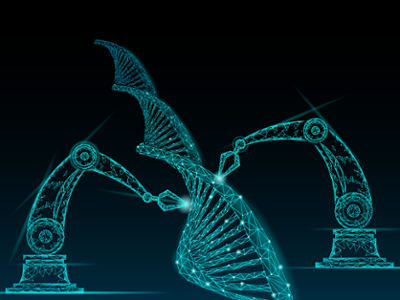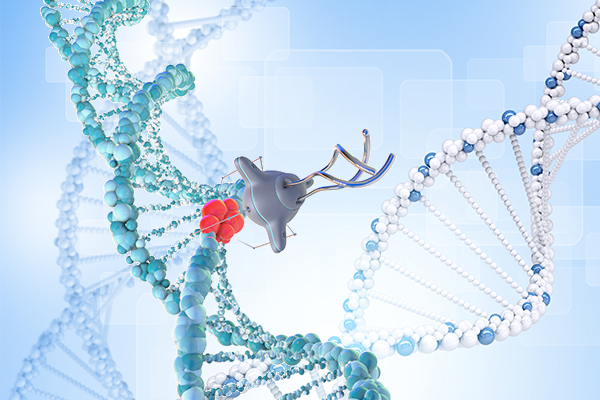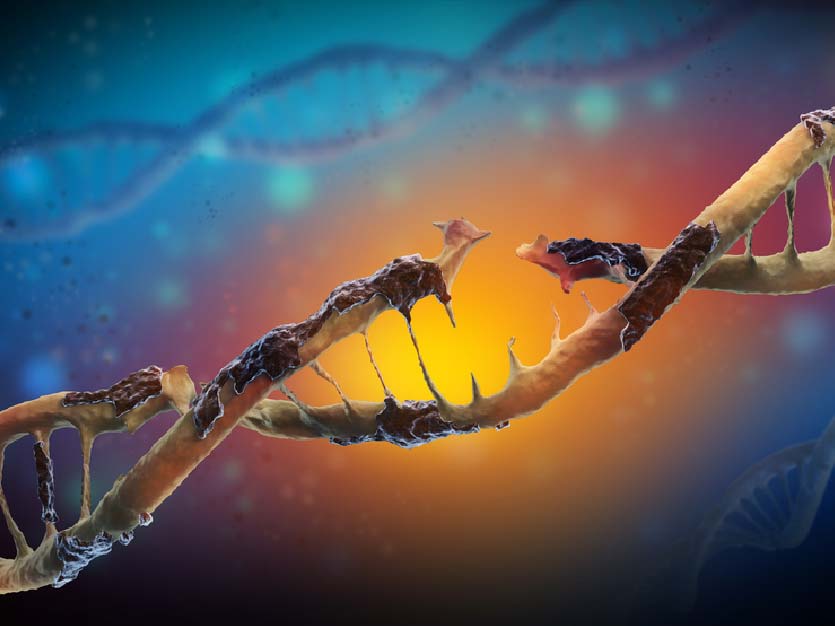The cell cycle is a series of phases that takes place in a cell as it grows and divides. The cell spends most of its time in interphase. During this interphase the cell grows, replicates its chromosomes, and prepares for cell division. Once the cell leaves interphase, it will undergo the process of mitoses and start divining in order to create daughter cells. These new daughter cells will then enter their own interphase and begin a new round of the cell cycle. The cell cycle and its cues are of the utmost importance, because without the cues the cells can either multiply continuously, forming masses, or will not multiply. These cues are cyclins which controls the cell cycle progression.
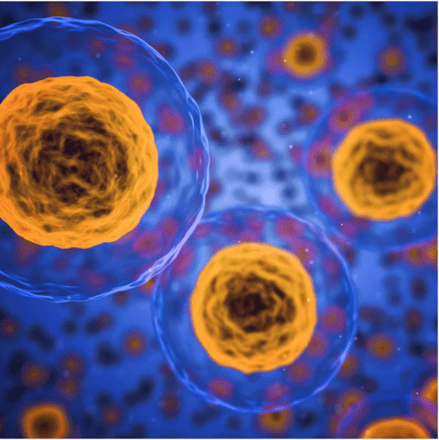
Functions and Application of Cyclins
Cyclins are proteins that control the cell progression in the cell cycle by activating cyclin-dependent kinase (CDK) which controls the cell cycle processes through phosphorylation. The concentration of cyclins varies according to the stage of the cell cycle. There are 4 phases in the cell cycle, Gap1 (G1), DNA synthesis (S), Gap 2 (G2) and Mitosis (M) phase. Different cyclins function in different phases of the cell cycle along with their associated CDK. The cyclin subunit determines which proteins are held close to the CDK. Cyclins themselves have no enzymatic activity but have binding sites for some substrates and target the CDKs to specific subcellular locations.
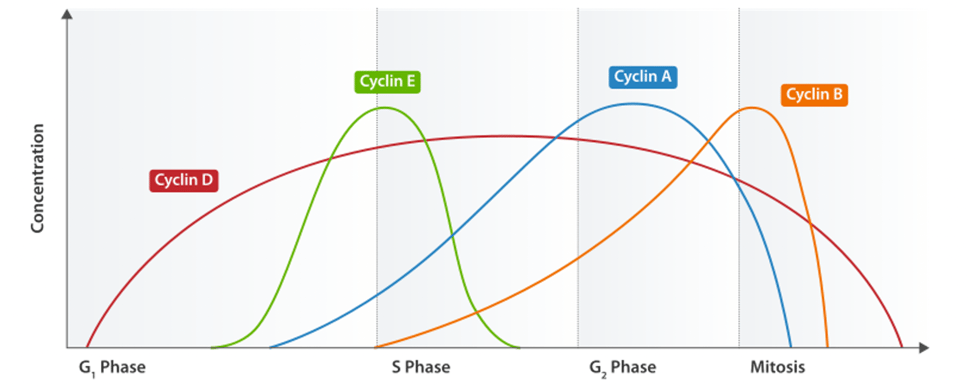
Figure 1 Source: Wikimedia Foundation. (2021, July 15). Cyclin. Wikipedia. Retrieved October 13, 2021, from https://en.wikipedia.org/wiki/Cyclin#/media/File:Cyclin_Expression.svg.
As shown in Figure 1, the concentration of the cyclins fluctuates throughout the cell cycle. This being said, the concentration levels of Cyclin D do not fluctuate. Their levels increase gradually throughout the cycle, regulating cellular growth. The concentration of Cyclin E increased with a peak in between late G1 and early S phase. Once the cyclin bound to CDKs, they begin to stimulate S phase CDK activity by preventing their inhibition, thus stimulating the beginning of DNA and centrosome replication. Cyclin A is involved in the induction of DNA replication and early stages of mitosis. Their levels rise at the beginning of S phase and fall in early mitosis. Finally, the levels of Cyclin B increase during mitosis and fall once the cell has passed the spindle formation checkpoint. They help the formation of spindles and chromosome alignment on the metaphase plate.
Cyclins – CDKs complex
As mentioned above, each cyclin subunit binds to a specific CDK forming a cyclin-CDK complex. This complex activates the cyclins upon binding to the cyclin which regulates different cell cycle transition:
- Cyclin D - CDK4/6 complex for G1 progression
- Cyclin E - CDK2 for the G1-S transition
- Cyclin A - CDK2 for S phase progression
- Cyclin A/B - CDK2 for entry into M-phase
Cyclin D and Cancer
The over expression of cyclin D, especially cyclin D1, plays a role in forming human tumors. These tumors can be, for example, mantle cell lymphomas and diffuse large B-cell lymphomas (non-Hodgkin lymphoma). Figure 2 shows the table on the role of the over expression of Cyclin D in different types of cancer.
| Parathyroid Adenomas | Cyclin D over expression in both neoplastic and non-neoplastic proliferation parathyroid tissue |
| Papillary thyroid carcinoma | Lymph node metastasis |
| Mantle cell lymphoma |
Higher age distribution Larger cell size Higher mitotic index More frequent gastrointestinal involvement Higher international prognostic index score Lower p27 expression Significantly worse survival |
| Breast cancer |
Higher tumor grade No correlation with axillary lymph node status or tumor size or HER2 amplification Poorer prognosis Indication need for additional chemotherapeutic treatment Positive correlation with ER status (p < 0.005) Positive correlation with PR status (p < 0.005) Inverse correlation to Nottingham prognostic index Inverse correlation to membrane EGFR Significantly shorter overall survival and relapse- free survival tamoxifen resistance |
Figure 2: Source: Stamatakos, M., Palla, V., Karaiskos, I., Xiromeritis, K., Alexiou, I., Pateras, I., & Kontzoglou, K. (2010, December 22). Cell cyclins: Triggering elements of cancer or not? World Journal of Surgical Oncology. Retrieved October 13, 2021, from https://wjso.biomedcentral.com/articles/10.1186/1477-7819-8-111/tables/1.
A new study on 3 types of Cyclin D (cyclins D1, D2, and D3), which will form complexes with their CDKs, specifically CDK4 and CDK6, to drive G1 to S phase progression. There are approved drugs that inhibits CDK4 and CDK6 as cancer therapies, but some patients don’t respond as strongly to the drugs.
In this study, it was found that AMBRA1 is a beneficial ligase that attaches molecular tags to all 3 types of Cyclin D, labeling them for destruction. The role of this enzyme was confirmed to be a tumor suppressor by monitoring cancer cell growth in mouse models of diffuse large B-cell lymphoma.
Currently, the team performing this study found that lymphomas lacking AMBRA1 are less sensitive to CDK4/6 inhibitors. When the AMBRA1 gene is missing, levels of Cyclin S become high enough to form complexes with another CDK (CDK2), which cannot be inhibited by CDK4/6 inhibitors. The research team is planning to study the effect of combining CDK4/6 inhibitors with CDK2 inhibitors in tumors with low AMBRA1 levels, along with the mutations in cyclin D that make them insensitive to AMBRA1 in the future.
Development in the Market
In October 2021, FDA has approved Eli Lilly Verzenio® (abemaciclib) with endocrine therapy (tamoxifen or an aromatase inhibitor) as the first and only CDK4/CDK6 inhibitor for the adjuvant treatment of adult patients with HR+ HER2- High Risk Early Breast Cancer. In 2018, Verzenio® (abemaciclib) from Eli Lilly and Kisqali (ribociclib) from Novartis were approved for HR- HER2- metastatic breast cancer. Currently, there are many studies and clinical trials targeting CDKs, especially CDK2.
How ABclonal can Help
ABclonal offers a variety of cell cycle related, cyclins and CDKs antibodies and ELISA kits covering many popular research areas. We have currently over 300 cyclin, cell cycle related, cyclins and CDK products with multiple applications that are currently in our inventory. ABclonal is also committed to continue development of additional CD products to meet the growing market demand.
Available Antibodies for Cyclins
|
Target |
Cat.No. |
Product Name |
Applications |
Reactivity |
|
Cyclin A2 |
Cyclin A2 Rabbit mAb |
WB, IHC, IF |
Human Mouse Rat |
|
|
Cyclin A2 Rabbit pAb |
WB, IHC, IF |
Human Mouse Rat |
||
|
Cyclin B |
[KO Validated] Cyclin B1 Rabbit mAb |
WB |
Human Mouse |
|
|
Cyclin B1 Rabbit pAb |
WB, IHC, IF, IP |
Human Mouse Rat |
||
|
Cyclin B2 Rabbit pAb |
WB, IHC |
Human Mouse Rat |
||
|
Cyclin C |
Cyclin C Rabbit pAb |
WB, IHC, IF |
Human Mouse Rat |
|
|
Cyclin C Rabbit pAb |
WB |
Human Mouse Rat |
||
|
Cyclin D |
[KO Validated] Cyclin D1 Rabbit mAb |
WB, IHC, IF |
Human Mouse Rat |
|
|
Cyclin D1 Rabbit pAb |
WB, IP |
Human Mouse Rat |
||
|
Cyclin D2 Rabbit pAb |
WB, IHC, IF |
Human Mouse Rat |
||
|
[KO Validated] Cyclin D3 Rabbit pAb |
WB |
Human Mouse |
||
|
Cyclin D3 Rabbit mAb |
WB |
Human Mouse Rat |
||
|
Cyclin E |
Cyclin E1 Rabbit pAb |
WB |
Human Mouse Rat |
|
|
Cyclin E2 Rabbit mAb |
WB |
Human |
||
|
Cyclin E2 Rabbit pAb |
WB, IF |
Human |
||
|
Phospho-Cyclin E1-T77 Rabbit mAb |
WB |
Human Mouse |
||
|
Cyclin H |
Cyclin H Rabbit mAb |
WB, IHC, IF |
Human Mouse |
|
|
Cyclin T1 |
Cyclin T1 Rabbit pAb |
WB |
Human |
|
|
Cyclin K |
Cyclin K Rabbit pAb |
WB |
Human Mouse Rat |
|
|
Cyclin Y |
Cyclin Y Rabbit pAb |
WB |
Human Mouse Rat |
Reference
Cell cycle. Genome.gov. (n.d.). Retrieved October 13, 2021, from https://www.genome.gov/genetics-glossary/Cell-Cycle.
Center for Drug Evaluation and Research. (n.d.). FDA approves abemaciclib with endocrine therapy for early breast cance. U.S. Food and Drug Administration. Retrieved October 13, 2021, from https://www.fda.gov/drugs/resources-information-approved-drugs/fda-approves-abemaciclib-endocrine-therapy-early-breast-cancer.
Center for Drug Evaluation and Research. (n.d.). FDA approves abemaciclib. U.S. Food and Drug Administration. Retrieved October 13, 2021, from https://www.fda.gov/drugs/resources-information-approved-drugs/fda-approves-abemaciclib-initial-therapy-hr-positive-her2-negative-metastatic-breast-cancer.
Commissioner, O. of the. (n.d.). FDA approves First Cancer Drug through new oncology review pilot that enables Greater Development Efficiency. U.S. Food and Drug Administration. Retrieved October 13, 2021, from https://www.fda.gov/news-events/press-announcements/fda-approves-first-cancer-drug-through-new-oncology-review-pilot-enables-greater-development.
Simoneschi, D., Rona, G., Zhou, N., Jeong, Y.-T., Jiang, S., Milletti, G., Arbini, A. A., O’Sullivan, A., Wang, A. A., Nithikasem, S., Keegan, S., Siu, Y., Cianfanelli, V., Maiani, E., Nazio, F., Cecconi, F., Boccalatte, F., Fenyö, D., Jones, D. R., … Pagano, M. (2021, April 14). CRL4AMBRA1 is a master regulator of D-type cyclins. Nature News. Retrieved October 13, 2021, from https://www.nature.com/articles/s41586-021-03445-y#citeas.
Stamaakos, M., Palla, V., Karaiskos, I., Xiromeritis, K., Alexiou, I., Pateras, I., & Kontzoglou, K. (2010, December 22). Cell cyclins: Triggering elements of cancer or not? World Journal of Surgical Oncology. Retrieved October 13, 2021, from https://wjso.biomedcentral.com/articles/10.1186/1477-7819-8-111.
Wikimedia Foundation. (2021, July 15). Cyclin. Wikipedia. Retrieved October 13, 2021, from https://en.wikipedia.org/wiki/Cyclin


